Related Research Articles
The National Institute for Research in Digital Science and Technology (Inria) is a French national research institution focusing on computer science and applied mathematics. It was created under the name French Institute for Research in Computer Science and Automation (IRIA) in 1967 at Rocquencourt near Paris, part of Plan Calcul. Its first site was the historical premises of SHAPE, which is still used as Inria's main headquarters. In 1980, IRIA became INRIA. Since 2011, it has been styled Inria.
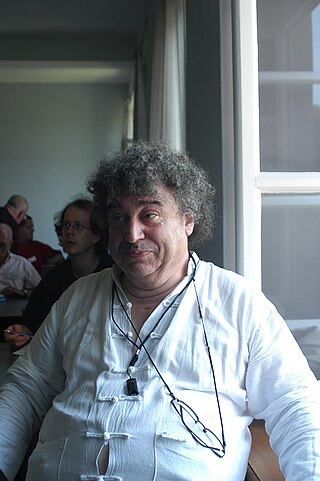
Philippe Flajolet was a French computer scientist.

Xavier Leroy is a French computer scientist and programmer. He is best known for his role as a primary developer of the OCaml system. He is Professor of software science at Collège de France. Before his appointment at Collège de France in 2018, he was senior scientist at the French government research institution Inria.
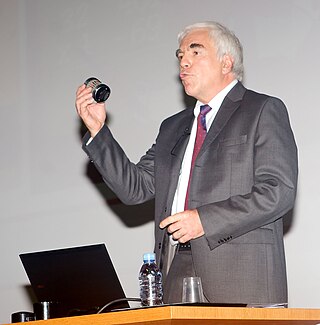
Gérard Philippe Berry is a French computer scientist, member of the French Academy of Sciences, French Academy of Technologies, and Academia Europaea. He was the Chief Scientist Officer of Esterel Technologies from 2000 to 2009. He held the 2007-2008 yearly Liliane Bettencourt chair of Technological Innovation at the Collège de France. He was Director of Research at INRIA Sophia-Antipolis and held the 2009-2010 yearly Informatics and Digital Sciences chair at the Collège de France. Berry's work, which spans over more than 30 years, brought important contributions to three main fields:
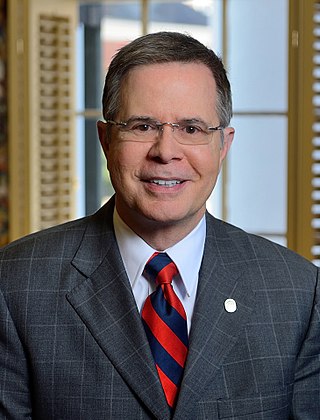
Jeffrey Scott Vitter is a U.S. computer scientist and academic administrator. Born in 1955 in New Orleans, Vitter has served in several senior higher education administration posts. He is a former chancellor of the University of Mississippi. He assumed the chancellor position on January 1, 2016. His formal investiture to the chancellorship took place on November 10, 2016, at the University of Mississippi's Oxford Campus.
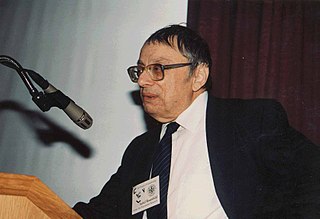
Azriel Rosenfeld was an American Research Professor, a Distinguished University Professor, and Director of the Center for Automation Research at the University of Maryland, College Park, Maryland, where he also held affiliate professorships in the Departments of Computer Science, Electrical Engineering, and Psychology. He was a leading researcher in the field of computer image analysis. Over a period of nearly 40 years he made many fundamental and pioneering contributions to nearly every area of that field. He wrote the first textbook in the field (1969); was founding editor of its first journal, Computer Graphics and Image Processing (1972); and was co-chairman of its first international conference (1987). He published over 30 books and over 600 book chapters and journal articles, and directed nearly 60 Ph.D. dissertations.
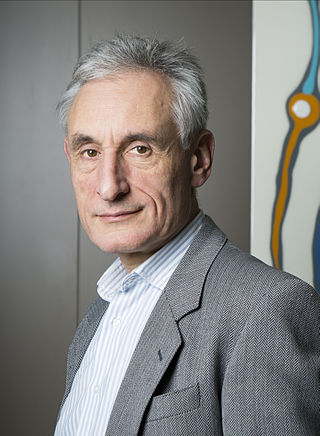
Andrew Blake FREng, FRS, is a British scientist, former laboratory director of Microsoft Research Cambridge and Microsoft Distinguished Scientist, former director of the Alan Turing Institute, Chair of the Samsung AI Centre in Cambridge, honorary professor at the University of Cambridge, Fellow of Clare Hall, Cambridge, and a leading researcher in computer vision.

Shimon Ullman is a professor of computer science at the Weizmann Institute of Science, Israel. Ullman's main research area is the study of vision processing by both humans and machines. Specifically, he focuses on object and facial recognition, and has made a number of key insights in this field, including with Christof Koch the idea of a visual saliency map in the mammalian visual system to regulate selective spatial attention.

Nikos Paragios is a distinguished professor of Applied mathematics at CentraleSupélec, the school of engineering of the Paris-Saclay_University and founder, president and chief executive officer of TheraPanacea, an information technology company targeting precision medicine in oncology, neurology and beyond through holistic treatment pathways optimization.
The International Conference on Computer Vision (ICCV) is a research conference sponsored by the Institute of Electrical and Electronics Engineers (IEEE) held every other year. It is considered to be one of the top conferences in computer vision, alongside CVPR and ECCV, and it is held on years in which ECCV is not.
In computer vision, the Azriel Rosenfeld Award, or Azriel Rosenfeld Life Time Achievement Award was established at ICCV 2007 in Rio de Janeiro to honor outstanding researchers who are recognized as making significant contributions to the field of Computer Vision over longtime careers. This award is in memory of the computer scientist and mathematician Prof. Azriel Rosenfeld.
Thierry Goudon is a French mathematician. He works in applied mathematics, with interest in the study of Partial Differential Equations motivated from physics. He has made contributions on kinetic theory, which corresponds to a description of matter in terms of statistical physics. The Boltzmann equation for gas dynamics is a typical example of this activity. The kinetic framework also arises in many other fields: neutron transport, radiative transfer, and biology. He is interested in asymptotic analysis, including the study of hydrodynamic regimes and homogenization theory, establishing relationships between microscopic and macroscopic descriptions. He also works on fluid mechanics, both as regards the analysis of the equations and also the design of numerical methods for computing the solutions. Currently he holds a Senior INRIA Researcher position at Sophia Antipolis; he is the head of the team COFFEE devoted to Complex Flows For Energy and Environment.

Côte d'Azur University is a public research university located in Nice, France, and neighboring areas. In 2019, it replaced the University of Nice Sophia Antipolis and the community (ComUE) that was created in 2013. On 9 January 2020, Jeanick Brisswalter was elected as president of Côte d'Azur University.
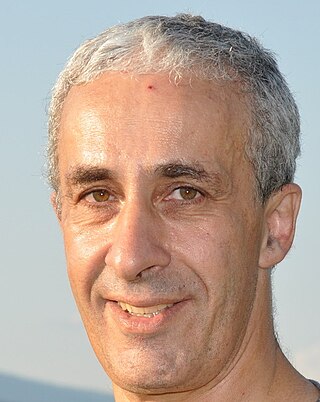
Pascal Fua is a computer science professor at EPFL. He received an engineering degree from École Polytechnique, Paris, in 1984 and a Ph.D. in computer science from the University of Orsay in 1989. He joined EPFL in 1996. Before that, he worked at SRI International and at INRIA Sophia-Antipolis as a computer scientist.
Rachid Deriche is a research director at Inria Sophia Antipolis, France, where he leads the research project Athena aiming to explore the Central Nervous System using computational imaging. He has published more than 60 journals and more than 180 conferences papers with a Google Scholar H-index of 67. He is known for the development of the edge detection algorithm, named after him.
Monique Teillaud is a French researcher in computational geometry at the French Institute for Research in Computer Science and Automation (INRIA) in Nancy, France. She moved to Nancy in 2014 from a different INRIA center in Sophia Antipolis, where she was one of the developers of CGAL, a software library of computational geometry algorithms.
Berthold Klaus Paul Horn is an American scientist working in the field of artificial intelligence and computer vision. He is Professor of Electrical Engineering and Computer Science at Massachusetts Institute of Technology (MIT). He is also Principal Investigator at the Computer Science and Artificial Intelligence Laboratory (CSAIL) at MIT.
Nicholas Ayache, born on 1 November 1958 in Paris, is a French computer scientist and Research Director at INRIA, Sophia Antipolis-Mediterranean Centre. Previously, he was Scientific Director of the Institut hospitalo-universitaire de Strasbourg (2012–2015) and Visiting Professor at the Collège de France (2014). He is also a member of the French Academy of Sciences.
Alain Bensoussan, born on 12 May 1940 in Tunis, is a French mathematician. He is Professor Emeritus at the University of Paris-Dauphine and Professor at the University of Texas at Dallas.

Josiane Zerubia is a French research scientist. She is the Director of Research at INRIA (DRCE), Université Côte d'Azur. Dr. Zerubia has made pioneering research contributions. She has been the Principal Investigator of numerous projects like of the Ayin (2012-2016), the Ariana (1998-2011) and of the Pastis (1995-1997). Presently, she is leading as head of the Ayana exploratory project (2020-2023). She has been professor (PR1) at SUPAERO (ISAE) in Toulouse since 1999.
References
- ↑ Olivier Faugeras at the Mathematics Genealogy Project
- ↑ "Academie des technologies: Annuaire Académiciens". Archived from the original on 2011-09-04. Retrieved 2017-08-09.
- 1 2 3 "Dr. Olivier Faugeras" (PDF). 2014 Okawa Prize. Retrieved 8 August 2017.
- ↑ "Olivier Faugeras - Biography". Sophia Antipolis Mediterranee. INRIA. Retrieved 4 January 2020.
- ↑ ECCV'08 Awards
- ↑ "Olivier Faugeras received the Okawa Prize and the Azriel Rosenfeld Award". Inria. 22 December 2015. Archived from the original on 9 August 2017. Retrieved 9 August 2017.